Looking for the best car air filter? No problem. Here’s our run-down of some of the key aftermarket names you should know about and why you should consider upgrading your car air filter.
You may not know where to start when modifying a car, but a performance car air filter is certainly one of the most popular places to begin your journey. First of all though, do you know what a car air filter does?
What is a car air filter?
Put simply, it does exactly as the name suggests, it filters the air that enters your engine. Its job is to block tiny bits of dirt that get sucked into your car from making their way into the engine and potentially damaging sensors and other engine components.
The car air filter sits at the front of the induction system, usually enclosed in an air box, and fed air through piping. The filter itself is either made from paper, cotton, foam or metal, and each material has its benefits and negatives.
Now we’ve got the information on what it is and how it works out of the way, I’m going to shed some light on which the best brands are so you can start your modifying journey.
Best Car Air Filter 2024
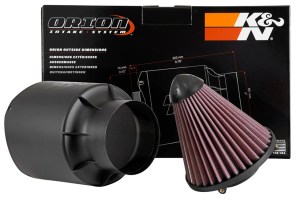
K&N Air Filters
You just can’t have any filter guide without K&N because they’re hands down the biggest, and most famous, performance filter company on the planet.
The all-American company has been around since the late ‘60s. It manufactures over 12000 different applications, for just about every car, truck and motorbike around the world. So, you can pretty much guarantee you’ll find one for your specific motor, no matter what vehicle you happen to drive. In fact, these guys are so big that nowadays they’ve become a genericized brand name in their own right. You call your vacuum cleaner a Hoover, hot tubs Jacuzzis, hook and loop fasteners Velcro and performance air filters K&Ns. “You got a K&N on that?” We’ve all heard that one.
The founding engineers, Ken Johnson and Norm McDonald (yes, that’s where the K&N name comes from) practically invented the use of high-flow cotton gauze for filter elements. As a result, it’s lead the way for many tuning companies ever since. Starting with motorbike parts and bolt-on pancake filters for carb-fed vehicles they now offer the absolute lot – panel filters, cones, cold air intake kits, performance airboxes, everything you could ever desire. And what’s more, they all come with their famous ‘Million Mile Warranty’. That should tell you everything you need to know about durability. It rightfully places in our guide to the best car air filter in 2023.
Oh yeah, there’s also the urban myth that the K&N company is owned by Micky ‘Whiplash’ Rourke. Strange but true.
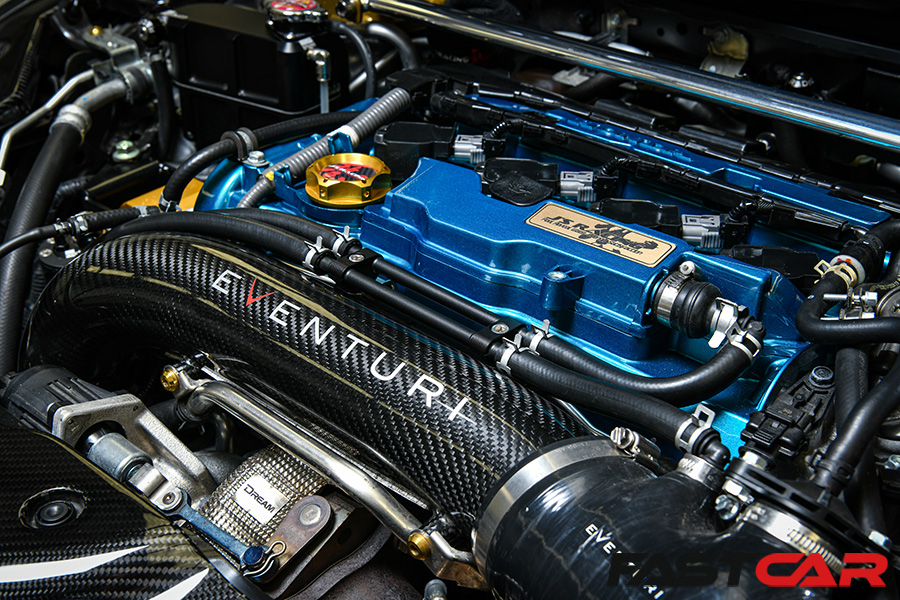
Eventuri Intakes
Could these be the poshest intakes on the market right now? We wouldn’t be at all surprised. Show stopping looks, impeccable engineering and the utmost exclusivity obviously doesn’t come cheap, but is it worth dropping a grand or two on an induction upgrade? Well, just take a look at what these guys have on offer…
Put together by a team of proper aeronautical engineers, despite the rarity of these carbon fiber works of art, it’s surprising just how many cars they cater for. They cover way more than we imagined when we looked. But basically, if you’re the kind of guy that needs a forklift to get your wallet out of your pocket, these are the only people you call. Besides, who doesn’t feel like a failure if their Urus and Huracan doesn’t have matching carbon airbox kits, anyway?
What won’t come as a surprise of course, is that most of the cars listed are suitably high-end. Naturally it’s mostly European luxo-barges with an AMG or M badge on the boot. But, we’re happy to say that there’s also a few top-level Civic Type Rs, Mk 5 Supras and the GR Yaris in there, too. Although, that’s about as realistic as it gets. Maybe that’s the whole point.
What’s most important of all is the no-expense-spared technology they’ve brought to the table. Eventuri don’t do simple panel filter upgrades, or basic intakes for that matter. Instead the vast majority of their kits are engineered to incorporate their unique inverted cone filters. These puppies have been engineered to act like a massive velocity stack, smoothing out the airflow to increase the airspeed by invoking the Venturi effect. This gives you more power and a smoother delivery over more conventional intake designs. You just can’t argue with science, can you?
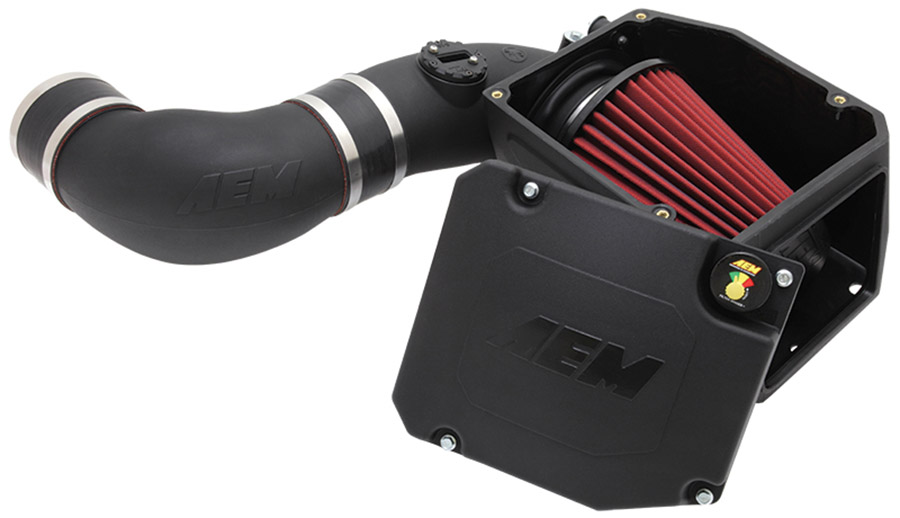
AEM
There’s no doubt that AEM manufacture some of the most highly-regarded products of any brand out there. We also love the fact that there’s no guessing or disappointments with their huge selection of cotton filters and cold air intakes, either. There’s some serious R&D that goes into all their products and the rolling road results are right there in black and white.
AEM have been around since the late 1980s and for many years specialized in vintage American cars, along with street racers and modified imports. But their first DIY intake kit – which was designed for the Honda CRX – hit the market in 1994, instantly achieving legendary status in the tuning community. Nowadays, although they still cater for Japanese cars and all the home-grown V8 monsters you’d expect, they’re perhaps most famous for tuning the European ‘imports’. For this reason, AEM have always maintained appearances; absolutely nailing the performance aspect, but still catering for the more decerning tastes that come with premium Euro motors.
Maybe what’s best is all their clever technical innovations. They manufacture plenty of their oil-free DRYFLOW panel filters and cones to fit scores of vehicles. But, when it comes to their CAD designed intakes, they were one of the first to think to relocate the filter out of the bay to eliminate heat soak. Nowadays, their patented Dual Chamber Intakes (which are designed to utilize multiple frequency soundwaves to create even more power) are some of the most talked about products out on the market, too. Rightfully deserving of a place on our guide to the best car filter in 2023.
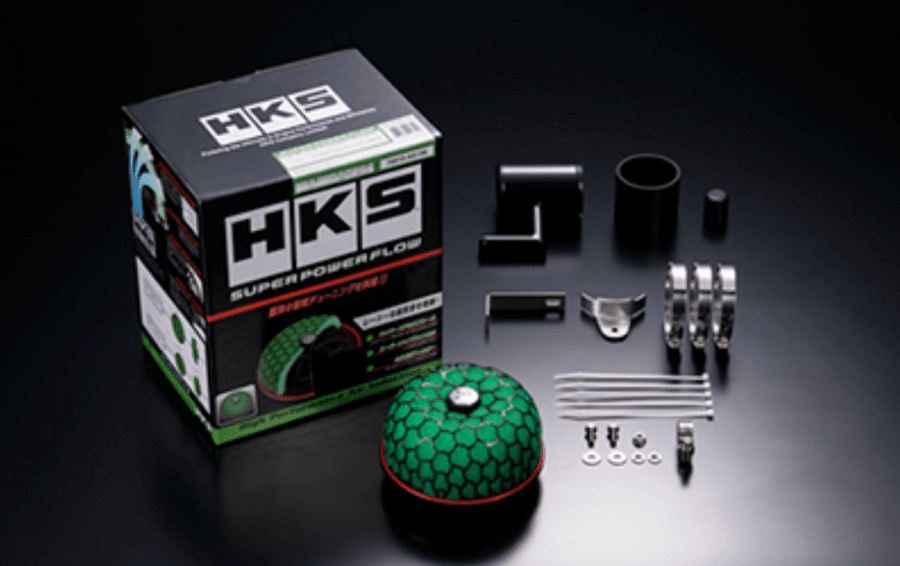
HKS
Can we look at the world’s best car air filter without acknowledging HKS? Of course we can’t.
Now, we know that the brainchild of Hiroyuki Hasegawa, Goichi Kitagawa and Sigma Automotive has spawned alloy radiators, stainless steel exhausts and all sorts of other high-end tuning gubbins over the years. But maybe, just maybe, their SPF ‘mushroom’ filters, are some of their most iconic products ever. They’re certainly a common sight the world over. They may not be new and obviously you can only get direct-fit kits for Japanese tuner cars – the likes of RX-7s, Skylines, Subarus and… er, the Suzuki Wagon R. There’s no denying that the green HKS Super Power Flow filter is as instantly recognizable as the McDonald’s’ Golden Arches or Coca Cola’s Contour Bottle .
Naturally though, being HKS, the main product that we’ve heard of is a mere drop in the Pacific compared to the other kits they make. You’ve got the basic Super Air Filter, which is a direct-fit panel. Then there’s the Premium Suction which comes with some flash piping for your standard airbox. And then you’ve got the full-on Carbon Cold Air Intake, the GT Suction, Carbon Racing Suction and the Racing Suction kit. In other words, there’s plenty of crazy-looking trinkets to ponder.
Suitably high end, infinitely desirable and a fair few quid, HKS are truly the Dyson of the car air filter market.
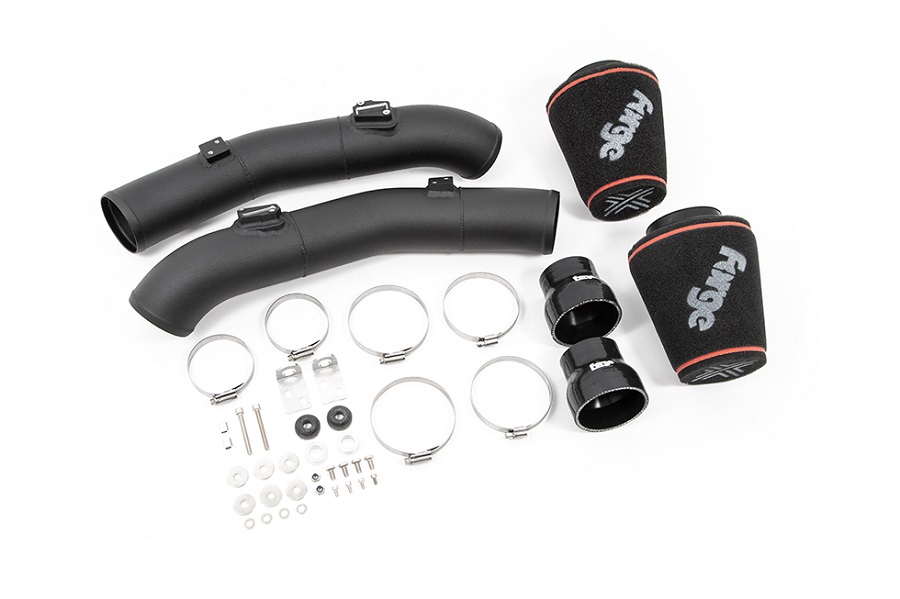
Forge Motorsport
Since the nineties Forge have become one of the most popular brands for serous tuners, particularly in the USA. With these guys it’s all about offering the best possible quality for their huge range of performance upgrades. They develop everything in-house – from Big Brake Kits and radiators to silicone hoses and dump valves – and there’s no doubt that they offer some of the most revered gear for those in the know.
Now, arguably it’s the Ford and VAG communities where they made the most impact initially, but over the years their products have stormed the Euro segment and worked their way well into the Japanese and US tuner stables. You simply can’t go wrong with Forge, it’s like an unwritten rule of modifying these days, and that’s what makes them one of our biggest and brightest exports.
All this of course, extends to their impeccably-designed induction kits, of which there are many, many different applications, covering a wide range of core cars. What’s a little weird for a guide like this though, is that they don’t make actual filters themselves, instead they’ve partnered with some of the UK heavy-hitters – experts such as Pipercross and RamAir – to take care of those.
What Forge do is optimize everything else in the kit, and it has to be said that they do it extremely well. From all their experience in race tuning, these guys are some of the leading experts in maximizing the benefits of cone filters by using the latest tech to develop some of the best-fitting, best-performing, bolt-on intake kits and carbon airboxes available anywhere. Like we said, you just can’t go wrong.
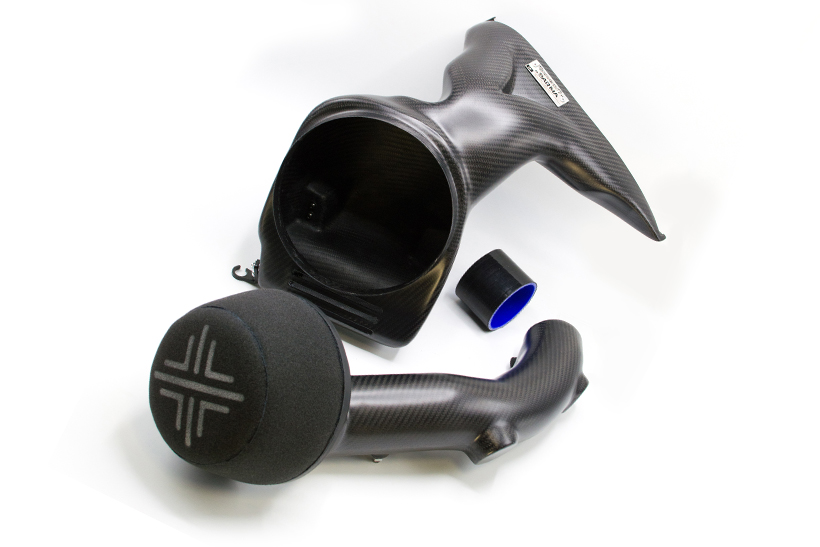
Pipercross
There’s no doubt that Pipercross is a British institution, they’ve been going strong for the past 4-decades. These guys are the global pioneers in using foam technology for filter element material, making their products the most renowned foam filters around the world.
Not only do Pipercross offer a massive fitment list of universal and direct-fit panel, cone and intake kits to cover the vast majority of road cars out there, but their competition range aims to provide the solution for all those awkward random applications, too. This little lot covers those weird and wonderful intake systems you’ll find on classic cars and those in the world of motorsport, with everything from bolt-on jobs for Formula Ford racers to huge filters designed for ITB and Twin Carb setups. Basically then, they’ll be able to sort out anything you happen to be bolting together.
What we like most though, is that modifying innovation for maximum performance gains has always been the name of the game. And most often it’s not just about the filter itself, but all the other engineering around it. From their super-high-end V1 Carbon Airboxes to their Velossa Tech kits – which come with vehicle-specific, OEM-style RAM intakes to scoop up plenty of the good stuff – it’s easy to see why these guys remain right at the top of the modifying game.
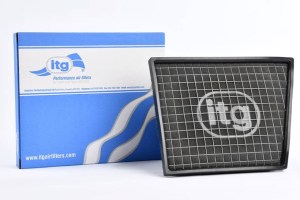
ITG
What we’ve always admired about ITG is their strict no messing about policy. There’s no flash marketing, weird celebrity endorsements or undeserved hype here. For these guys, it’s all about the performance. In fact, despite being around for more than 30 years, they may not even be on your radar. Well, not unless you’re one of the world’s top motorsport engineers. WRC, BTCC, Le Mans and even those mentalist Monster Jam trucks, let’s just say that ITG’s client list is long and distinguished. You’ll find an ITG filter bolted to many an F1 car, too. So, perhaps that’s all we need to say. It would be difficult to argue why ITG shouldn’t feature in our guide to the best car air filter in 2024.
It’s not just about out-and-out motorsport applications, you’ll find Induction Technology Group products in all sorts of weird and wonderful places. They’re OEM equipment for the likes of Aston Martin, Renault Sport and Ascari. And plenty of mega tuners like TRD, NISMO and the mighty Cosworth swear by them.
But, what does this mean for you? The good news is that you can benefit from all this experience. These guys offer a whole host of filters for road cars (performance models or otherwise) ranging from their Profilter panels, to Maxogen cone filters with carbon airboxes and all the trimmings for a little more money.
Got a custom build, race team or something awkward? No problem, ITG even have a bespoke Custom-fit service where they can develop and test a solution for you in as little as 48-hours. They’re also one of the very rare firms to produce both foam and cotton gauze filters, meaning that they’ll always pick whatever works best for each application. As you can imagine, that’s almost unheard of.
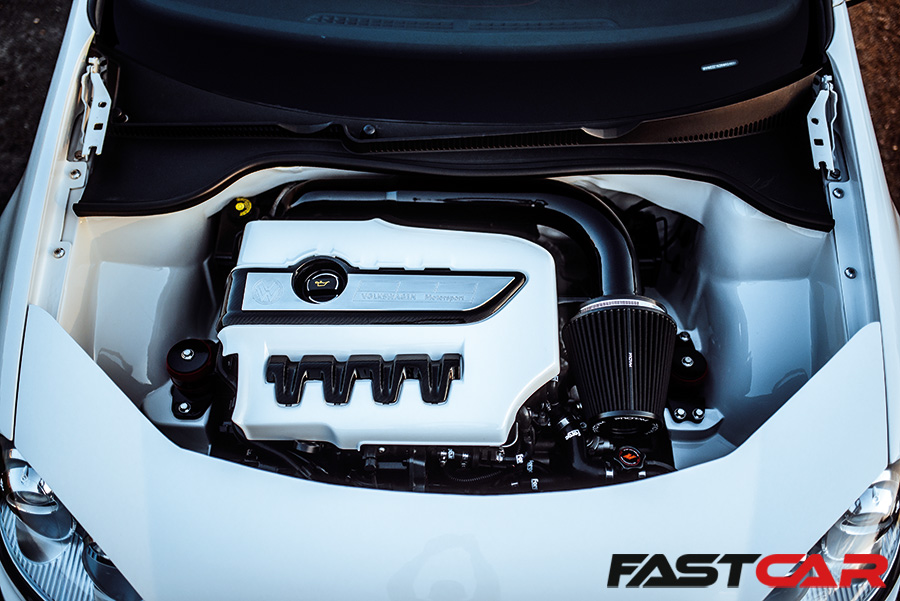
RamAir
RamAir are one of the big British names these days and it’s easy to see why they have a veritable army of fans on these shores. The reason is pretty simple in fact, over the last decade or so they’ve become a UK modifying powerhouse by offering some of the best quality and most indestructible kits out there. A novel concept we’re sure, but one that works.
Once again, we’re loving the no-nonsense approach exuded by everything they do. We can’t help but admire the fact that their selection of foam RamAir filters, and their cotton PRORAM filters, offer exactly what they say on the tin – they just work exceptionally well and last forever. Oh, and perhaps even better than that, they don’t pull your pants down when it comes to the prices. Consider this; we can’t fault the build quality and all their products come with a lifetime warranty, but their cone filters start at around the same money as a basic panel filter just about everywhere else.
But price aside, we can’t overlook the fact that they all look pretty damn sexy, either. Aside from the 400-strong selection of universal cones and direct-fit panel filters, there’s also over 170 supremely-engineered intake kits, many of which come with posh laser-cut heat shielding, silicon hoses, specially designed intake piping, oversized filters or all of the above. To be honest it also seems like there’s not a week goes by that we don’t see yet another application added to their ever-growing fitment list, too. Commendable stuff indeed, hence why it places in our guide to the best car air filter in 2024.
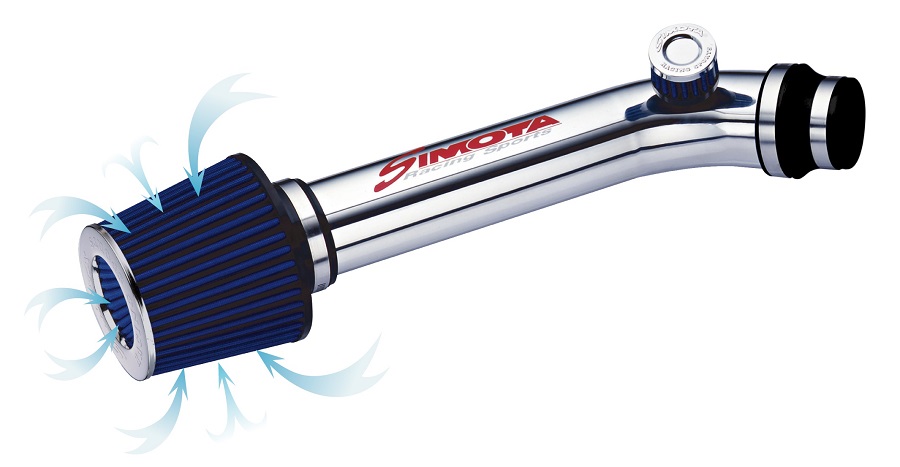
Simota Racing Sports
Even though Simota wasn’t around until the nineties, even to those of us with way too many years under our belts, it seems like this massive Taiwanese firm has been a part of the modifying fabric since the dawn of existence. All this is for good reason though; Simota have had a huge influence on the car community over the years. In fact, many credit these guys as being the very first to offer any bolt-on intake kit, let alone an affordable one.
In any case it’s clear that Simota were busy squirreling away developing a ton of direct-fit induction mods for the mass market when most of the rest could just about manage a universal cone or two. And that’s what makes them bona fide pioneers in the filtration game.
Allegedly they also came up with the idea of flashy looking kits with alloy charge pipes, carbon boxes and other polished, adonized or chrome trim. Basically, all the flashy stuff to show off to your mates. A lot of bonnets remained firmly shut at car shows before Simota came along, that’s for sure.
Despite all this though, perhaps Simota are most known for their universal cone filters. Again, they changed the game by not only offering decent quality urethane cones that work well for increasing power, but they also made them look the part by adorning them with bright colors and shiny trinkets.
Simota continue to develop some great products and pump them out at realistic prices, and there’s a lot to be said for that.
How we chose the best car air filters
For this list, we’ve relied on the expertise of long-term Fast Car contributor Midge Burr. Midge is a qualified mechanic and serial-modifier who was working on cars long before he was old enough to drive. If there’s something Midge doesn’t know about modifying cars, it’s likely not worth knowing at all.
Midge has been working on Fast Car since the early 2000s, and has edited a number of other modified car magazines across those years, including Banzai mag and Performance Vauxhall.
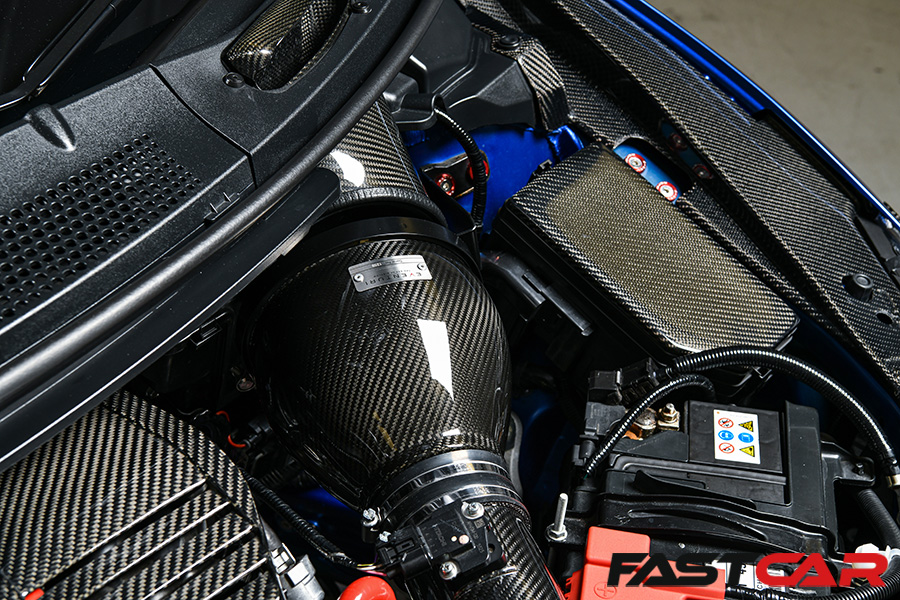
Frequently Asked Questions About Car Air Filters
Induction Kit vs. Filter Upgrade
Most people that modify their cars, however, tend to upgrade the whole induction system, rather than just replacing a filter. That said, if you’re on a super tight budget, an uprated panel filter or replacement cone filter is a quick and easy way to get a *slightly* enhanced induction noise, and an extra 1-3 horsepower if you’re lucky. Not that you’d be able to feel it.
For that reason, if car tuning is more than just a fleeting interest for you, it’s always best to opt for a full induction kit. In fact, this is a must if you’re planning on beefing up the car’s internals. Sure, it’ll cost more, but you’ll get a lot more reward in the shape of performance gains. This is because most induction kits increase the size of the intake piping, and alter where the system’s location. Reputable aftermarket brands will ensure that they design each system to maximize the efficiency of airflow too, which in turn means you can channel more air into the engine at a faster rate. Long story short, that helps to create more horsepower.
As a result of these two differing options when it comes to upgrading your car’s intake system, the list we’ve compiled below looks at brands that offer the best panel or cone air filter, as well as complete induction systems.
Why upgrade your car air filter?
There are many benefits to upgrading your car air filter, not least that uprated air filters are serviceable and reusable, so they’ll easily last the lifetime of your vehicle. They also look the part, create that sought-after induction roar and, most important of all, will pull more air into your engine to net you a few cheeky horses. Yep, performance filters suck big time, but that’s in a good way.
But, you know what? It doesn’t matter if you’re looking for a replacement panel filter a simple cone upgrade, an induction kit or a flashy airbox and intake job, we’re here to help by showing you where you can find some of the very best.
How to buy the best engine air filter
Air filters are simple really. If you’re getting a direct panel filter replacement then the big thing to get right is to make sure you buy one which fits your car’s air box. Aside from that, you want something made from a material with enough strength to keep out unwanted contaminants, while still maximizing the amount of airflow available to the car’s engine.
If you go down the route of a cone filter, the biggest thing to consider here is placement (and therefore temperature). As the cone filter is usually exposed rather than being contained within a box, you need to make sure it’s situated in the best place possible to breath in *cold* air, not hot air. Remember, hot air saps power. As a result, some high-end cone filter kits will provide the pipework to ensure you can place them down low in the front bumper, for example. Alternatively, if your situation requires that you keep your cone filter in much the same place as where the old panel filter was, it might be worth investing in a heat guard to shield the cone filter from some of the heat emanating from the engine.
How often should I change a car air filter?
Some motor manufacturers have extended the recommended interval for replacing a standard air filter. Whilst this saves many car owners money, does it help to optimize performance and fuel economy?
Take the third-generation Toyota Avensis with a 2.2-liter diesel engine. The recommended service interval for replacing the air filter is every four years or 40,000 miles. Our advice is to inspect the air filter at least every year and if it’s clogged with dirt, replace it. Be sure to check out our car maintenance checklist for more information on servicing.
Still not convinced about the performance benefits of upgrading your air filter? Check out our myth-busting filter performance test!
The post Best Car Air Filter in 2024 appeared first on Fast Car.
